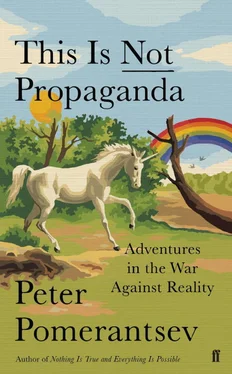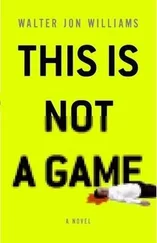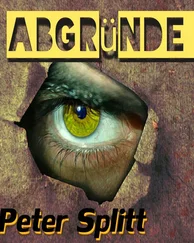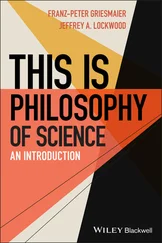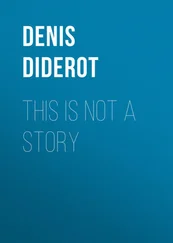‘Isn’t that democracy,’ asks Oakes rhetorically, ‘when you give people what they want?’
His former colleague Nix made a similar argument when testifying to the UK Parliamentary Committee on Disinformation and ‘Fake News’, which I had been brought into as one of many ‘specialist advisers’.
‘We are trying to make sure that voters receive messages on the issues and policies they care most about… that can only be good for democracy,’ Nix told the Committee, utterly unrepentant about any of his actions.
By the time I joined, the Committee had already been going for two years, and it had become obsessed with the question of what exactly was ‘good for democracy’ in an age of ‘information abundance’. It had started by looking into ‘fake news’, but after astounded Members of Parliament heard testimony about how ethnic cleansing in Burma had been fuelled via Facebook, about Kremlin interference in Europe and the US, about how people’s online information was used to target them in political campaigns, the members of the Committee decided that ‘our existing legal framework is no longer fit for purpose’.
In this environment, people are able to accept and give credence to information that reinforces their views, no matter how distorted or inaccurate. This has a polarising effect and reduces the common ground on which reasoned debate, based on objective facts, can take place… the very fabric of our democracy is threatened.
In February 2019 I sat at the back of a room in the House of Commons as the Committee, made up of MPs from all parties, and their advisers went through detailed edits of their Conclusions and Recommendations. This was just the start of a long process. Their report would then be submitted to the government, which in turn was producing a White Paper with its plans on the subject, which would then be debated in Parliament. The editing process of the Committee was pernickety: MPs would question the meaning of each small phrase, the validity of each point of reference. It was slow going, but I found it oddly reassuring. Many novels of the nineteenth and twentieth century satirised the fussy language of bureaucracy, policy, the law. But in an age of utterly unstable meaning the slow, legalistic, evidence-scraping work of the Committee seemed a touch heroic.
Behind the MPs was a wide painting that showed a scene from the House of Commons in the eighteenth century, depicting men in wigs making some sort of elegant argument, while the other side listened politely and attentively. It was unlikely to have been a realistic scene – the House of Commons has always been a rowdy place full of cads and liars – but it did, at least, envision an ideal, what I imagined the Committee meant by ‘reasoned debate’ and ‘fabric of democracy’. The room we sat in featured oak panelling and thick, emerald-green wallpaper emblazoned with paisley prints; there were oil paintings of nineteenth-century prime ministers on the walls, their eyes all arrogance and wit; the fireplace was engraved with wood carvings of heraldic signs. Sitting there one felt part of a tradition. Could it adapt to the present?
The Committee began their report by emphasising the need to have a common set of definitions. They had originally described themselves as being concerned with ‘fake news’, but then found the meaning of those words was morphing to denote any content that someone didn’t like. They tried instead to differentiate between ‘disinformation’ (content designed to mislead) and ‘misinformation’ (content that misleads by accident). But many of the most pernicious campaigns I’d seen didn’t necessarily use ‘disinformation’. And even if ‘disinformation’ is identified, would, or indeed should, that make it illegal necessarily?
What if one were to refocus ‘disinformation’ from content to behaviour: bots, cyborgs and trolls that purposefully disguise their identity to confuse audiences; cyber-militias whose activity seems organic but who are actually part of coordinated campaigns full of fake accounts; the plethora of ‘news’ websites which look independent but are covertly run from one source, all pushing the same agenda? Shouldn’t one have the right to know if what looks organic is actually orchestrated? How the reality one is interacting with is engineered?
Ultimately, what does it mean to be an empowered, ‘democratic’ citizen, the kind that Srdja Popović envisions, online? How can the digital world become the space where ‘freedom’, ‘rights’ – all those big words that have become bled of their vitality – are regenerated and given meaning?
One part of this is, as cybersecurity specialist Camille François argued, protection from coordinated campaigns of harassment and intimidation by the powerful. Another part is protecting privacy, so you decide which bits of your online activity end up in whose hands and for what purpose.
Sitting in the committee room I began to imagine an online life where any person would be able to understand how the information meteorology around them is being shaped; why computer programs show you one piece of content and not another; why any ad, article, message or image is being targeted specifically at you; which of your own data has been used to try and influence you and why; whether a piece of content is genuinely popular or just amplified. Maybe then we would become less like creatures influenced by mysterious powers we cannot see, made to fear and tremble for reasons we cannot fathom, and instead would be able to engage with the information forces around us as equals. Could we even be empowered to have a stake in the decision-making process through which the information around us is shaped, with public input into the Internet companies who currently preside over how we perceive the world in darkness?
If one could instil these principles, then much of the framework of information war would fall away. The way to judge information would not be whether it came from ‘over there’ or ‘over here’, but whether the way it is offered allows you to engage with it on equal terms, rather than being belittled by some force that takes away your understanding of how you are being acted on. [1]
Sitting in that emerald-green room, under the oil painting of idealised parliamentary democracy, I considered other ideas I’d come across which could help find the ‘common ground on which reasoned debate, based on objective facts, can take place’. In Denmark I had first been told about ‘constructive news’, a journalism which goes beyond merely ‘balancing’ one set of opinions against another, but is always trying to find practical solutions to the challenges which face its audience, forcing politicians to make evidence-based proposals, which one could then evaluate over time, pegging their words back to reality, generating a conversation where facts become necessary again. This approach could help reinspire trust in journalism, because we trust those who work together with us for some greater goal. And by putting change back into our own hands, it can overcome the sense of helplessness which conspiracy-peddling politicians so like to push to make you feel that only they can guide you through a murky world of insurmountable and hidden powers…
The bell rang to signal a new vote in the House of Commons, and I snapped back to the present. It was the middle of February 2019, and Parliament was still struggling over how the UK should leave the European Union, as ordained by the Brexit vote Tom Borwick and his team had won just over two years earlier. Maybe, hopefully, by the time you read this the question will have been happily resolved. Political language will be clear again, political parties will represent clear interests, the future will be clear. But in that moment Parliament was somewhat different. Round the curved, mock-Gothic stone stairwells, through narrow green and beige corridors, in crowded bars and on the terraces that seem to almost tumble into the Thames, you heard the same words repeated and echoed and reverberating: ‘Brexit’, ‘the people’s will’, ‘sovereignty’. What any of them meant was moot. Borwick had won the vote by talking to so many audiences in so many different ways that one couldn’t say what the will of the people really was. Had the country voted to stop immigration? To protect animal rights? ‘Brexit means Brexit,’ the prime minister had said, but what did ‘Brexit’ actually mean? And were the people whose will it claimed to represent the same as ‘the many’, whom the Labour Party now claimed to champion vis-à-vis ‘the few’? But ‘the few’ Labour wanted to oppose were often the very ones who claimed to represent ‘the people’s will’. And who did these parties represent anyway, as in the middle of February 2019 they were all in a state of civil war, not only over leadership ambitions, but over their very meaning?
Читать дальше
